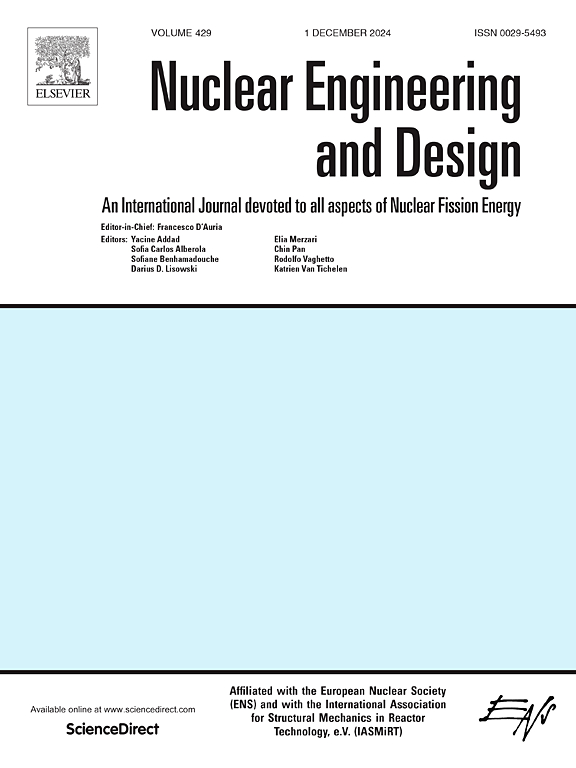The applications and prospects of BEPU methodology in Generation III nuclear reactors
IF 1.9
3区 工程技术
Q1 NUCLEAR SCIENCE & TECHNOLOGY
引用次数: 0
Abstract
The Best Estimate Plus Uncertainty (BEPU) methodology has been developed over decades and it has been validated in the safety assessment of nuclear reactors. The endorsement of BEPU by regulatory bodies signifies a substantial progression for its implementation. Numerous innovations have been suggested to enhance the efficiency and quality of the BEPU procedure to facilitate its deployment. Generation III/III+ reactors, as the predominant technology in contemporary commercial nuclear power, have undergone analysis, evaluation, and licensing with the use of BEPU techniques to varying degrees. The overview of BEPU applications employing thermal-hydraulic system codes under various scenarios was illustrated, and the characteristics of the calculated results were summarized and analyzed, including the uncertainty parameters selection and the methods of uncertainty quantification and sensitivity analysis. Surrogate model analysis scheme with qualified accuracy was proposed seeking to lower anthropogenic effects. The current effort is expected to provide an insightful summary and vision for the method optimization and further implementation of BEPU methodology.
BEPU方法在第三代核反应堆中的应用与展望
最佳估计加不确定性(BEPU)方法已经发展了几十年,并在核反应堆的安全评估中得到了验证。监管机构对BEPU的认可标志着其实施取得了实质性进展。为提高BEPU程序的效率和质量,建议了许多创新措施,以促进其部署。三代/三代+反应堆作为当代商业核电的主导技术,已经不同程度地使用BEPU技术进行了分析、评估和许可。概述了热液系统代码在各种场景下的BEPU应用,总结分析了计算结果的特点,包括不确定参数的选择、不确定度量化和灵敏度分析方法。提出了精度合格的替代模型分析方案,以降低人为影响。当前的工作有望为BEPU方法的方法优化和进一步实现提供一个有见地的总结和愿景。
本文章由计算机程序翻译,如有差异,请以英文原文为准。
求助全文
约1分钟内获得全文
求助全文
来源期刊

Nuclear Engineering and Design
工程技术-核科学技术
CiteScore
3.40
自引率
11.80%
发文量
377
审稿时长
5 months
期刊介绍:
Nuclear Engineering and Design covers the wide range of disciplines involved in the engineering, design, safety and construction of nuclear fission reactors. The Editors welcome papers both on applied and innovative aspects and developments in nuclear science and technology.
Fundamentals of Reactor Design include:
• Thermal-Hydraulics and Core Physics
• Safety Analysis, Risk Assessment (PSA)
• Structural and Mechanical Engineering
• Materials Science
• Fuel Behavior and Design
• Structural Plant Design
• Engineering of Reactor Components
• Experiments
Aspects beyond fundamentals of Reactor Design covered:
• Accident Mitigation Measures
• Reactor Control Systems
• Licensing Issues
• Safeguard Engineering
• Economy of Plants
• Reprocessing / Waste Disposal
• Applications of Nuclear Energy
• Maintenance
• Decommissioning
Papers on new reactor ideas and developments (Generation IV reactors) such as inherently safe modular HTRs, High Performance LWRs/HWRs and LMFBs/GFR will be considered; Actinide Burners, Accelerator Driven Systems, Energy Amplifiers and other special designs of power and research reactors and their applications are also encouraged.
 求助内容:
求助内容: 应助结果提醒方式:
应助结果提醒方式:


